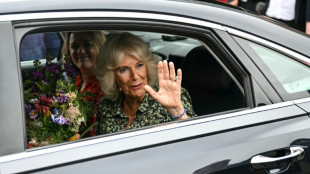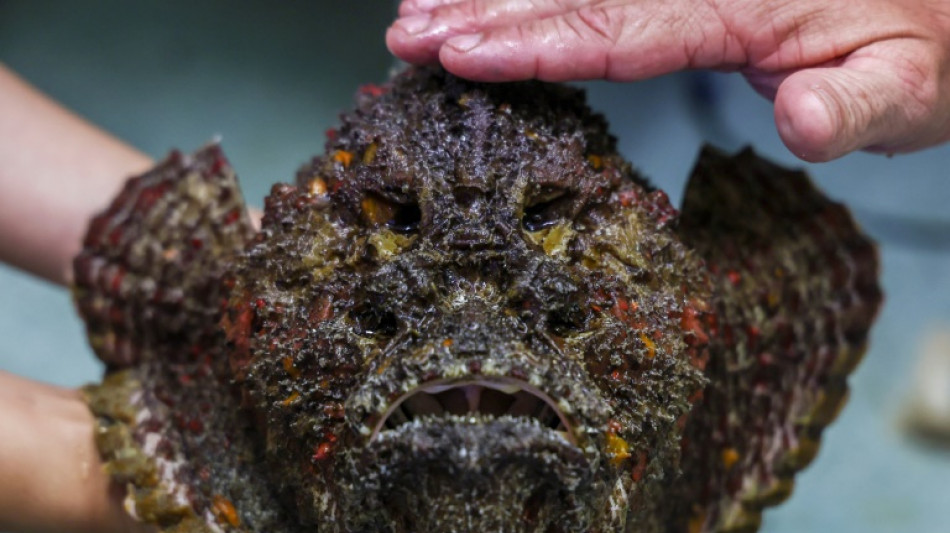
-
 Venezuela crackdown helped avert 'civil war': attorney general
Venezuela crackdown helped avert 'civil war': attorney general
-
Trump shapes team ahead of White House return

-
 Climate cash should also go to nuclear, says UN atomic chief
Climate cash should also go to nuclear, says UN atomic chief
-
Free Facebook in EU with less targeted ads

-
 Dupont set to be fit for New Zealand despite illness
Dupont set to be fit for New Zealand despite illness
-
New balls, please, plead top men's tennis players

-
 Ban rules Radradra out of Fiji's final November internationals
Ban rules Radradra out of Fiji's final November internationals
-
US contractor ordered to pay $42 mn to Iraqis tortured at Abu Ghraib

-
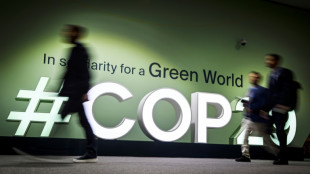 Lame-duck US climate team vows to be 'effective' at COP29
Lame-duck US climate team vows to be 'effective' at COP29
-
Painter Frank Auerbach, contemporary of Freud and Bacon, dies at 93

-
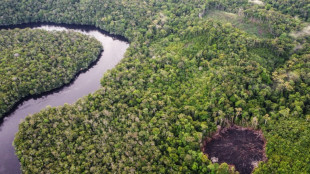 UN carbon market inches closer after COP29 agreement
UN carbon market inches closer after COP29 agreement
-
US finalizes waste methane fine on drillers, but future uncertain
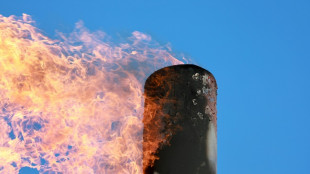
-
 Fifteen inmates killed in new Ecuador jail massacre
Fifteen inmates killed in new Ecuador jail massacre
-
Trump tariff worries trip up stocks rally, dollar climbs

-
 Israel opens Gaza humanitarian crossing but aid groups say not enough
Israel opens Gaza humanitarian crossing but aid groups say not enough
-
35 killed, dozens wounded in south China car ramming

-
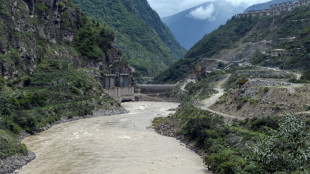 'Carbon-neutral' countries demand credit at COP29
'Carbon-neutral' countries demand credit at COP29
-
FA investigates Premier League referee Coote over video rant

-
 Boeing expects post-strike output recovery to take several weeks
Boeing expects post-strike output recovery to take several weeks
-
Trump shapes cabinet ahead of White House return

-
 Blinken in emergency Brussels trip on Ukraine after Trump win
Blinken in emergency Brussels trip on Ukraine after Trump win
-
All Blacks scrum-halves 'inspired' to play 'master' Dupont

-
 Medvedev sees off De Minaur to boost ATP Finals bid
Medvedev sees off De Minaur to boost ATP Finals bid
-
Lindt disputes US lawsuit claims, stands by 'excellence' labelling

-
 Trump tariff worries trip up stocks rally
Trump tariff worries trip up stocks rally
-
UK to beef up its emissions cuts as it bids to be 'climate leader'
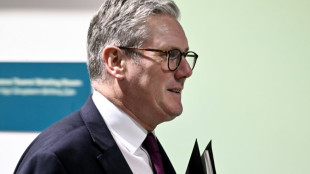
-
 Nations to submit boosted climate plans: what's at stake?
Nations to submit boosted climate plans: what's at stake?
-
French footballer Ben Yedder gets suspended jail term for sexual assault

-
 Nuclear watchdog chief says room to manoeuvre on Iran 'shrinking'
Nuclear watchdog chief says room to manoeuvre on Iran 'shrinking'
-
Russia jails doctor over alleged Ukraine comments during consultation

-
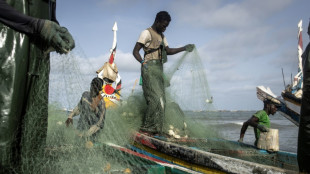 EU vessels to cease fishing in Senegal after accord expires
EU vessels to cease fishing in Senegal after accord expires
-
Bayer shares hit 20-yr low as problems pile up

-
 Russian MPs pass law banning 'propaganda' of childless lifestyles
Russian MPs pass law banning 'propaganda' of childless lifestyles
-
NATO 'must do more than just keep Ukraine in fight', says Rutte

-
 EU unity in a 'world on fire': Kallas makes top diplomat pitch
EU unity in a 'world on fire': Kallas makes top diplomat pitch
-
UK vows to cut greenhouse gas emissions by 81% on 1990 levels by 2035

-
 Crisis-hit Germany headed for February 23 snap election
Crisis-hit Germany headed for February 23 snap election
-
C.Africa urges lifting of embargo on diamond exports

-
 Poland hoping Swiatek can inspire BJK Cup 'revenge' against Spain
Poland hoping Swiatek can inspire BJK Cup 'revenge' against Spain
-
Court challenge begins against UK oil and gas field approvals

-
 Stock markets retreat on Trump tariff worries
Stock markets retreat on Trump tariff worries
-
Spain PM accused of 'blackmail' by tying budget to flood aid

-
 Lineker to leave Match of the Day after 26 years
Lineker to leave Match of the Day after 26 years
-
New EU chief diplomat backs Ukraine as bloc's top team faces grilling

-
 Hong Kong press union head sues WSJ for 'unreasonable dismissal'
Hong Kong press union head sues WSJ for 'unreasonable dismissal'
-
Politics v cricket leaves Champions Trophy up in the air

-
 Azerbaijan defends fossil fuels at COP29 as big names skip summit
Azerbaijan defends fossil fuels at COP29 as big names skip summit
-
Tech sector gathers in Lisbon in shadow of Trump victory

-
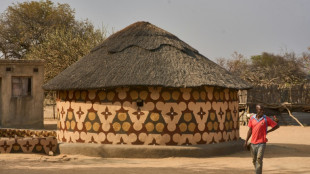 The women behind Zimbabwe's striking hut painting art
The women behind Zimbabwe's striking hut painting art
-
South Korea prosecutors indict controversial American streamer

| RYCEF | -2.37% | 7.16 | $ | |
| JRI | -2.05% | 13.248 | $ | |
| CMSC | -0.57% | 24.58 | $ | |
| BCC | -1.47% | 141.07 | $ | |
| GSK | -2.38% | 35.505 | $ | |
| RIO | -2.38% | 61.145 | $ | |
| NGG | -1.92% | 62.93 | $ | |
| SCS | 0.14% | 13.669 | $ | |
| CMSD | -0.71% | 24.785 | $ | |
| AZN | 0.48% | 65.1 | $ | |
| RELX | -2.61% | 46.585 | $ | |
| BCE | -0.67% | 27.665 | $ | |
| VOD | -9.97% | 8.475 | $ | |
| BTI | 0.23% | 35.23 | $ | |
| BP | -2.61% | 28.185 | $ | |
| RBGPF | 0.05% | 60.22 | $ |

Milking venom from Australia's deadly marine animals
Imagine feeling like an elephant is sitting on your chest, you can't breathe, there's a sense of impending doom and the pain is so intense you want to die.
You've just been stung by a tiny Irukandji jellyfish.
While you are unlikely to die, toxicologist Jamie Seymour of James Cook University in Australia says you'll wish you had.
He should know -- he's been stung 11 times.
But Seymour's job is riskier than most: milking sea creatures of their venom to create life-saving antivenoms.
Dozens of Irukandji jellyfish, some no bigger than a sesame seed, float in tanks inside a metal shed kept by the university in the state of Queensland.
In another tank, there are the most venomous fish in the world: the stonefish.
If its spines pierce your skin, the pain will cause you to lose consciousness and the area around the wound will turn black and die.
The stonefish's venom is powerful enough to kill humans, but there have been no recorded fatalities in Australia. Seymour is also among those who have survived its sting.
His team is studying Australia's deadliest marine animals in a bid to understand them and keep people safe.
"Australia is without a doubt the most venomous continent in the world," Seymour told AFP.
"When you talk to people, especially Americans, they're surprised that we don't all die at birth."
As Seymour moves around the tanks, he points out other deadly animals, including a box jellyfish which can kill a person within 10 minutes with its poison.
- Stings and bites -
Despite the countless venomous animals across Australia, fatalities are relatively rare.
The latest official data show that between 2001 and 2017, there were an average of 32 animal-related deaths a year, with horses and cows the biggest killers.
Since 1883, there have been only two recorded deaths from Irukandji jellyfish and about 70 deaths from box jellyfish.
By comparison, there were about 4,700 deaths from drug, alcohol and vehicle-related incidents in Australia in 2022 alone, according to government data.
"So, the chances of you being stung by an animal in Australia -- or bitten -- is reasonable, but the chances of dying very small," Seymour said.
His facility is the only one that milks venom from these deadly marine animals and turns it into antivenom.
For the deadly box jellyfish, that process is tricky. Researchers must remove their tentacles, freeze-dry them and collect the venom once it solidifies.
There's no antivenom for the Irukandji jellyfish.
Instead, doctors treat each symptom as it appears. If you get rapid medical advice, the chance of survival is high.
For the stonefish, the venom extraction process is more challenging.
Researchers insert a syringe into a live fish's venom glands, holding it with a towel while they withdraw a thimble full of the deadly fluid.
They then send the venom to a facility in the state of Victoria which processes it into life-saving antivenom.
First, the facility staff inject a small amount of venom over six months into an animal, such as a horse, which produces natural antibodies.
The animal's plasma is later removed and the antibodies are extracted, purified and reduced into an antivenom for humans.
- Deadly jellies -
Antivenoms are shipped to hospitals around Australia and some Pacific islands, where they can be administered if someone is stung or bitten by an animal.
"We have some of the best antivenoms in the world, there is no doubt about that," Seymour told AFP, noting the time and effort put into producing the serums in Australia.
And antivenom may be increasingly needed, as climate change can raise the risk of a sting, according to scientists.
About 60 years ago, the Irukandji jellyfish stinging season in Australia was in November and December.
With ocean temperatures staying warmer for longer, now the jellyfish can linger as late as March.
Warming oceans are also pushing these deadly sea jellies -- and other marine animals -- further south along the Australian coast.
Seymour's students have found that temperature changes can also alter the toxicity of venom.
"For example, if I make an antivenom for an animal at 20 degrees and I get bitten by an animal that lives in the wild at 30 degrees, that antivenom isn't going to work," he said.
Studies have also shown that venom from stinging creatures could be used to treat myriad health conditions, including one in which rheumatoid arthritis was effectively cured in mice in two weeks.
But this area of research remains largely unfunded, and Seymour says his work continues.
"When you think of the venom, think of it like a vegetable stew. There's a whole heap of different components that are in there," he said.
"What we've been trying to do is pull these things apart and work out what's going on."
O.Norris--AMWN


